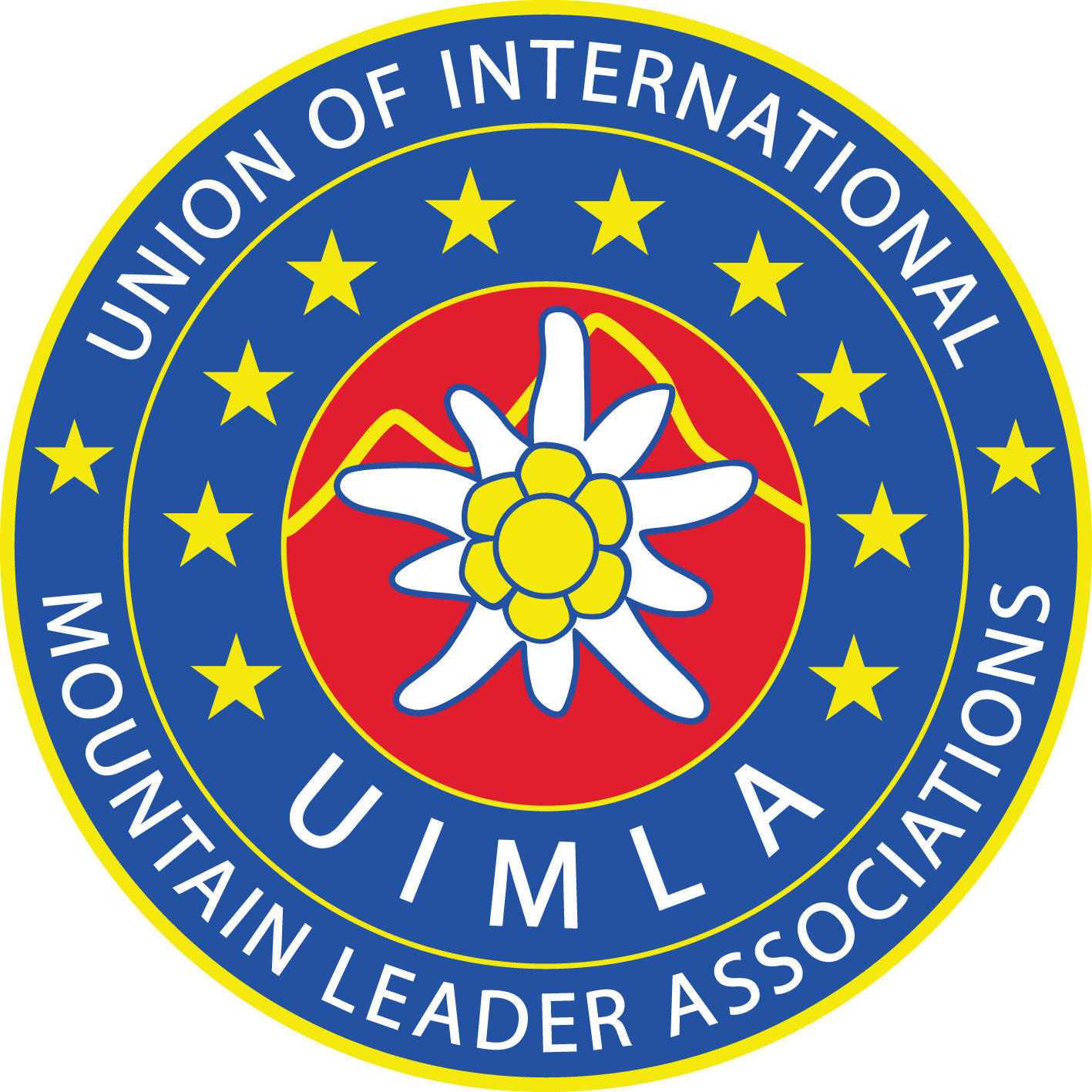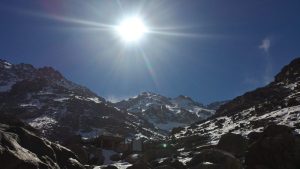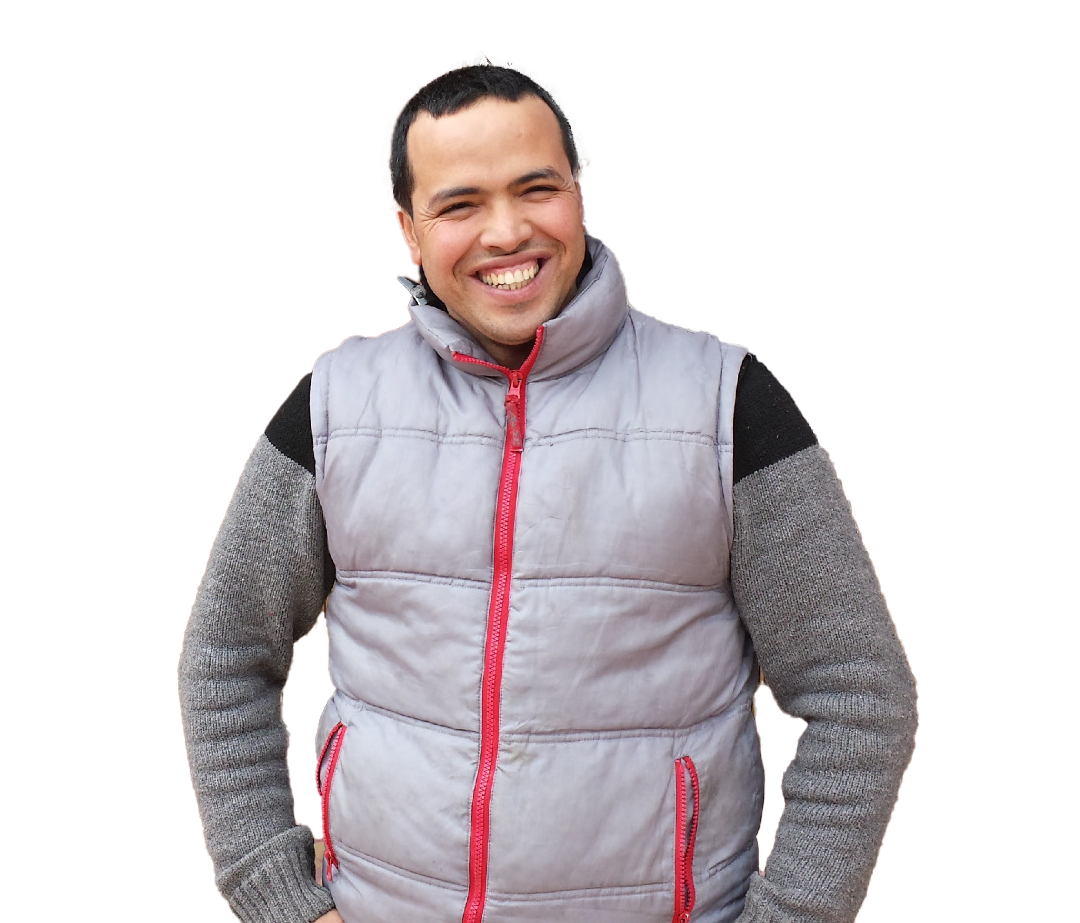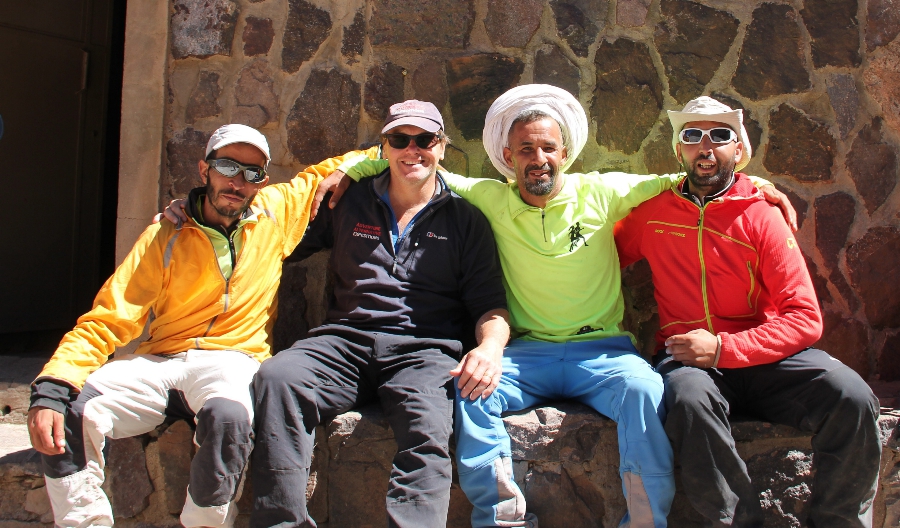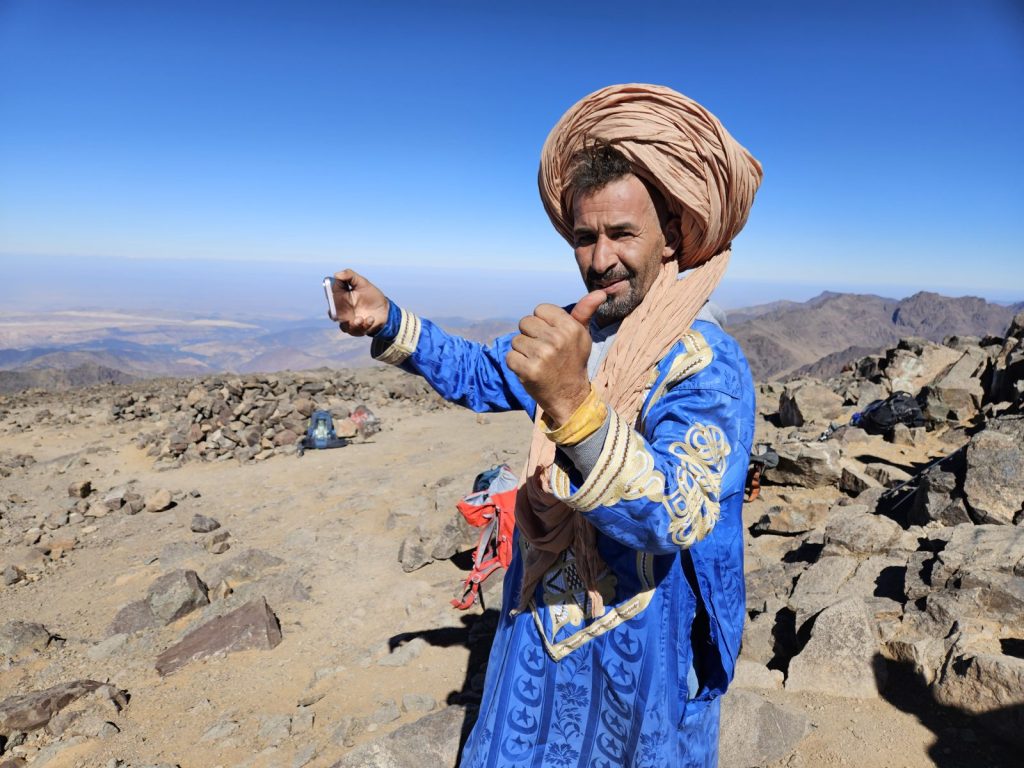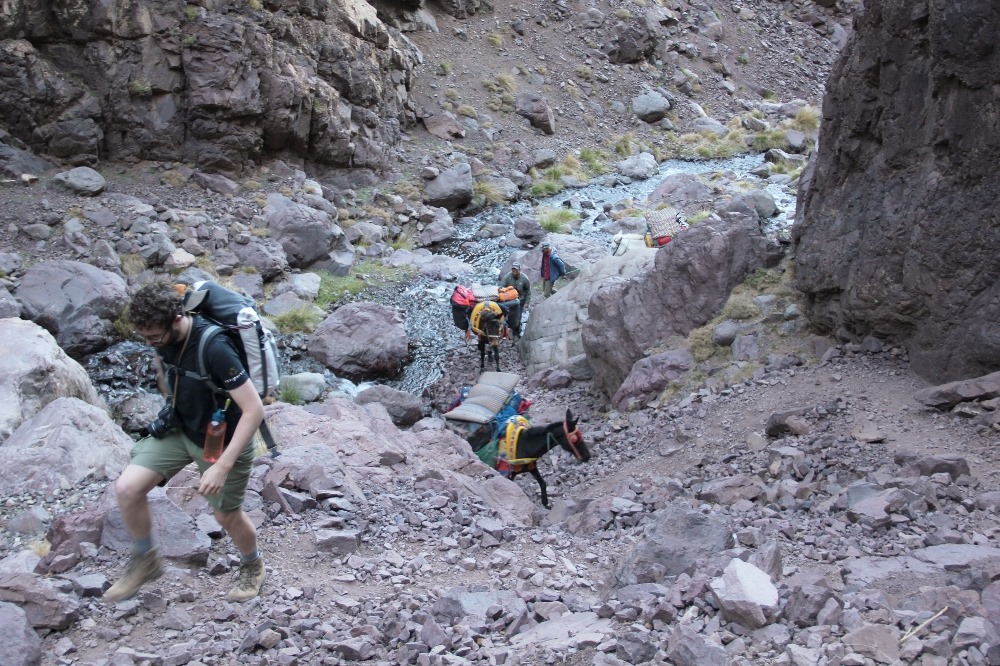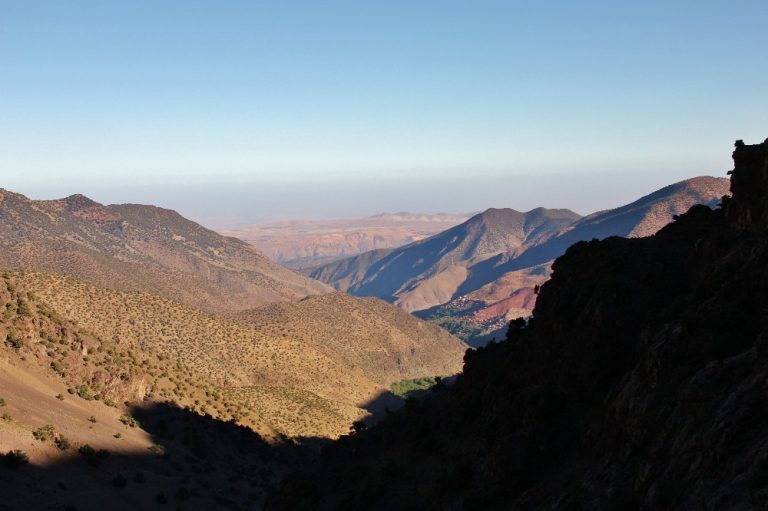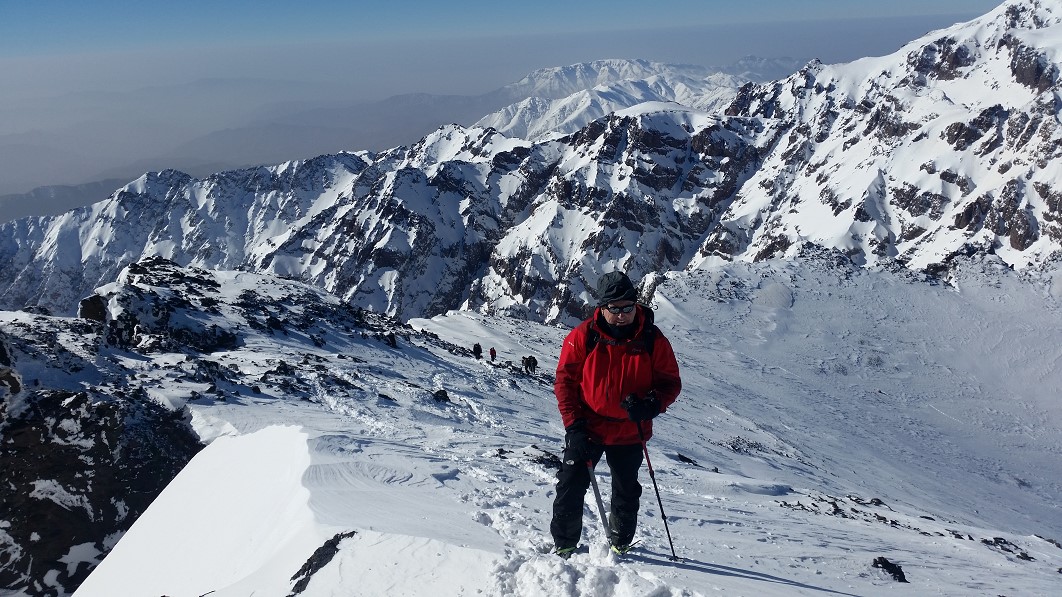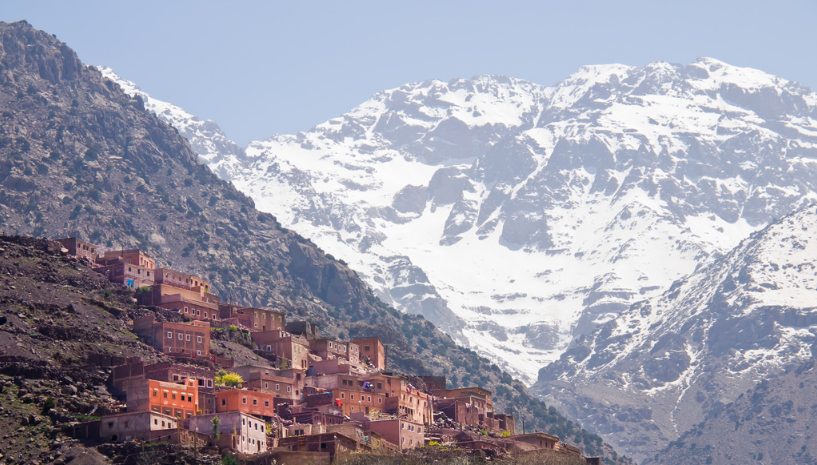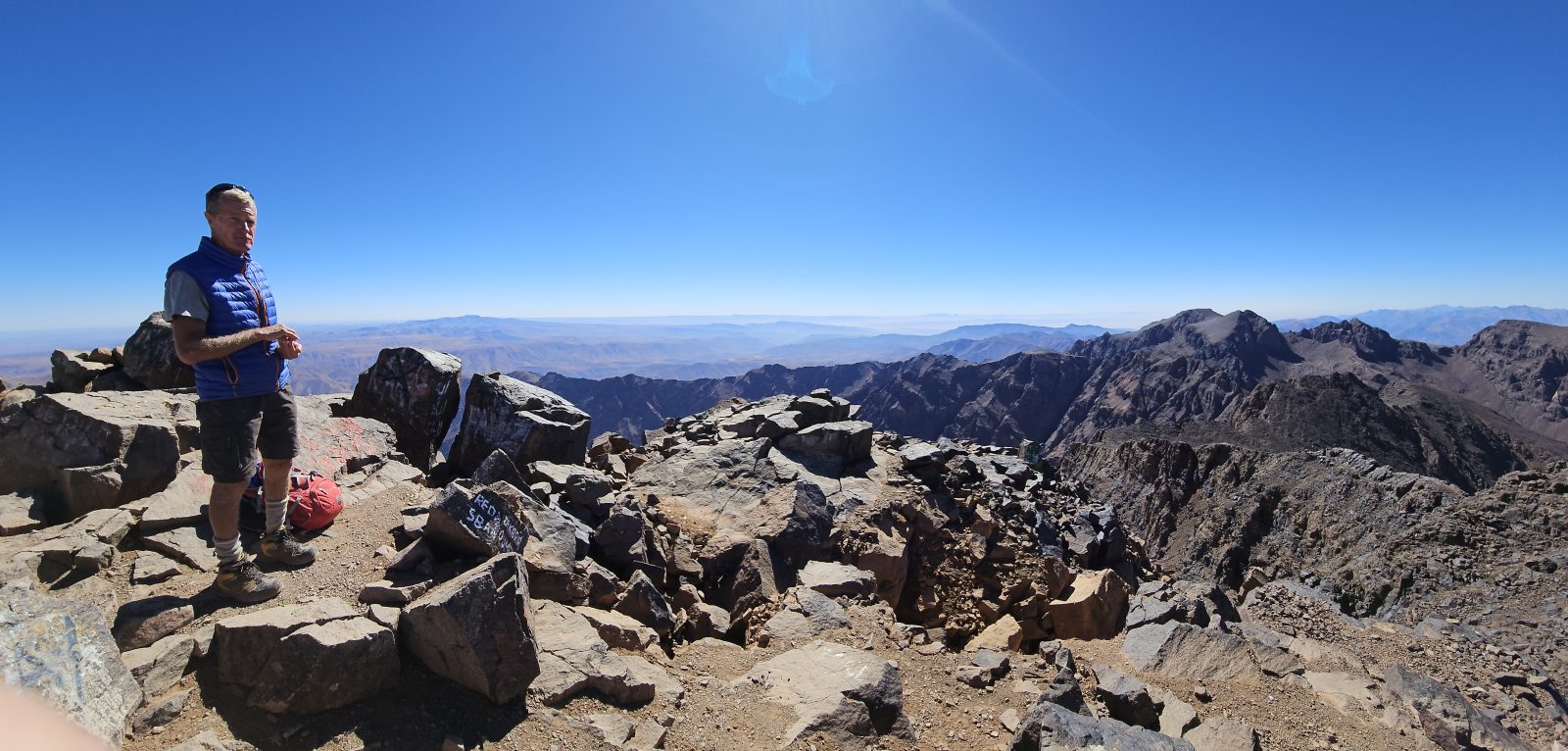
Mount Toubkal - Trekking in the Atlas Mountains in Summer
This is a trek in the Atlas mountains of Morocco with a summit of Mount Toubkal, the highest peak in North Africa. The summer season on Toubkal runs from April through to October, with July and August being much hotter. Late August to early October is a good time to go when the temperatures have dropped a bit and the apple and walnut trees are all in season and the slopes of the hills are covered in juniper bushes. Spring time from late April through to June is also very attractive, especially with the flowers and colours. For winter trips please have a look at our other Mount Toubkal Winter page.
Overview
This is a trek in the Atlas mountains of Morocco with a summit of Mount Toubkal, the highest peak in North Africa. The summer season on Toubkal runs from April through to October, with July and August being much hotter. Late August to early October is a good time to go when the temperatures have dropped a bit and the apple and walnut trees are all in season and the slopes of the hills are covered in juniper bushes. Spring time from late April through to June is also very attractive, especially with the flowers and colours. For winter trips please have a look at our other Mount Toubkal Winter page.
The trek is straightforward with ascents on paths and mule tracks to some high passes that afford great views across the Atlas range and across to the desert plains on a clear day. Accommodation is in mountain refuges or in tents depending on how hot it is. There are dormitories and facilities. We provide the staff, meals and mules for the trip so all you need is your clothing in a duffle bag and a day pack.
We run a week long trip in order to appreciate more of the Berber culture around Imlil and acclimatise for longer which makes for a more relaxed trip. Our four day trip takes you up and down Mount Toubkal but still allows for two nights at the refuge for acclimatisation. The hike out of the valley is straight after the summit so it’s quite a long day.
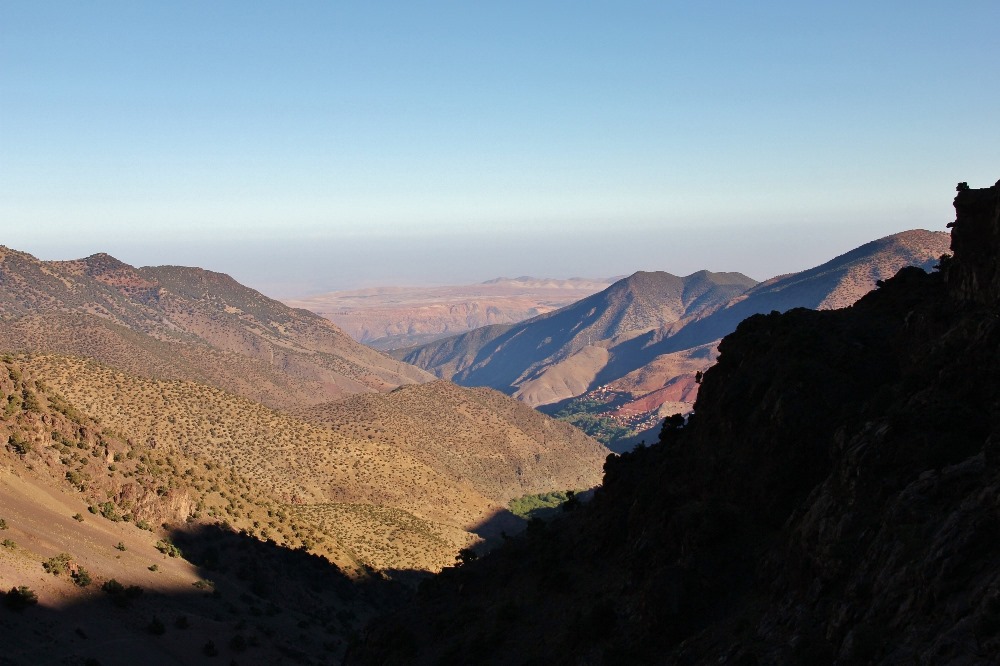
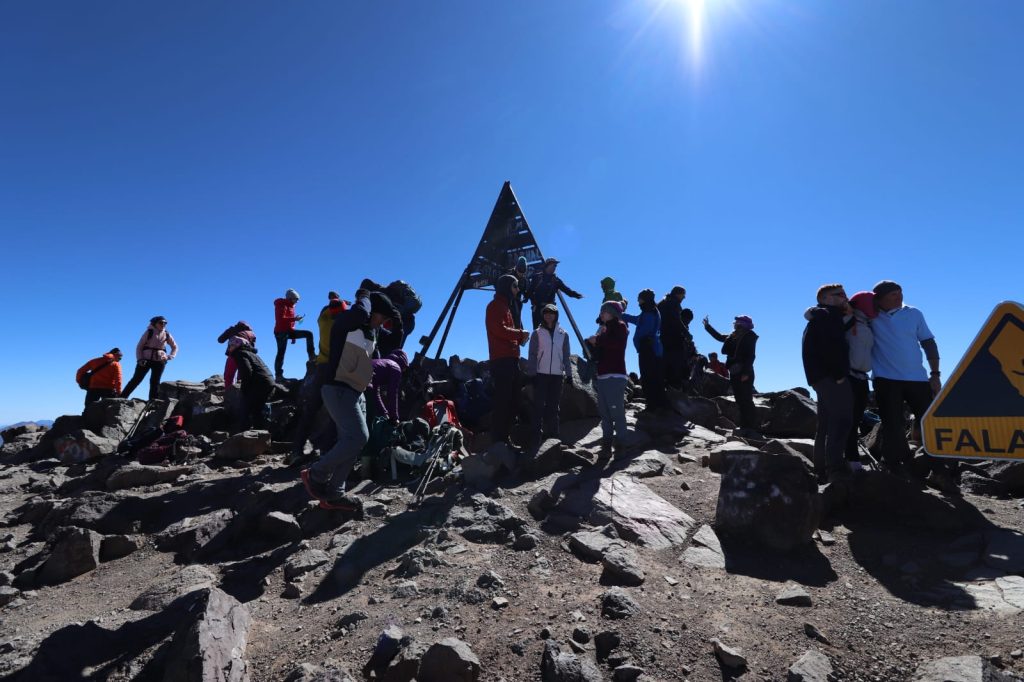
We work with the same local guides on every trip and Ahmed Amzil is a long time friend who owns the riad in Imlil where we stay with our groups. The personality of the trip is friendly and relaxed, Moroccans are gentle and always keen to help. While Marrakech is a bustling city, Imlil and the surrounding villages run at a much slower pace evoking the ancient Berber way of life which is still preserved today. The valleys echo with the calls to prayer, and everywhere there are children playing, mules doing the rounds with their loads and local people dressed in the jelaba tending their crops.
One of our clients had this to say:
“This was my first trek and first time away on my own so as you can imagine I was pretty nervous about coming on the trip but I had such a brilliant time and met some amazing people. Speaking with Adventure Alternative prior to booking really reassured me so all that was left for me to do was get excited and gather the gear.
The trip itself was well organised, the staggered ascent allowed for acclimatisation as well as getting a great insight into the Moroccan way of life and culture. I can honestly say I have never had holiday quite like it and now that I have the bug to see more and do more treks I could not think of a better company than Adventure Alternative to do it with.”
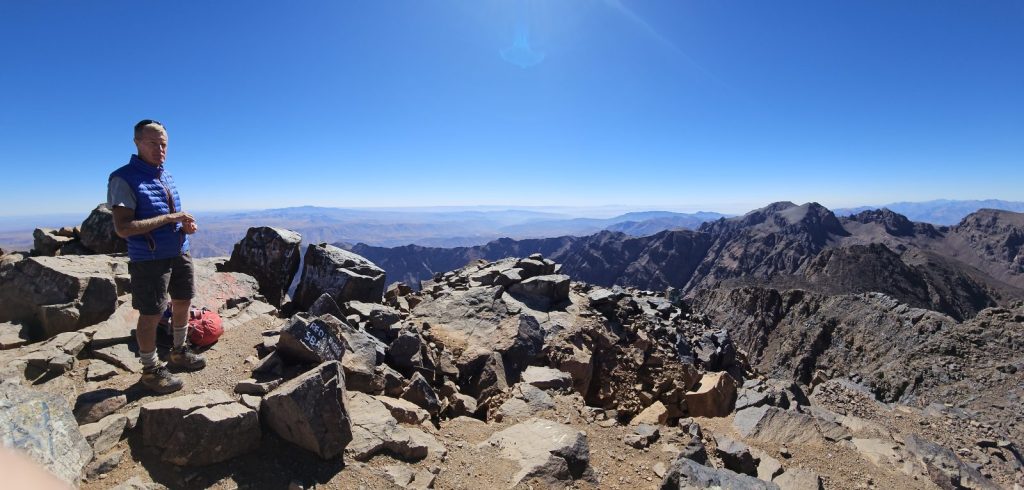
What Our Adventurers Think:
Thank you so much for a fantastic week of climbing – we had a lot of laughs and learnt a lot as well. A big thank you to everyone involved in the Winter Toubkal trip. Everything about the trip was fantastic – our time in Marrakech and Imlil, the group, all the Adventure Alternative staff and, of course, the climbing. To summit four 4,000 metre peaks in 3 days was brilliant and the opportunity to practice and consolidate my winter skills and to push myself on peaks like Akioud was much appreciated. And all in just a week off work! I am already planning the next trip.
Mount Toubkal Summer Trek itinerary for 7 days
Note: this trek can be done the other way around – going up the main valley to Toubkal first and then passing into the adjoining valley and stopping at the Tamsoult Refuge before coming back to Imlil.
Trek itinerary in four days:
| 1 | Drive up to Imlil and go for a short walk to the nearest pass for acclimatisation. |
| 2 | From Imlil start the walk up to Nelter Refuge at the base of the mountain. Either camp or stay in the hut depending on climate and time of year. |
| 3 | Acclimatisation day and walk further up the valley for photos and the views. |
| 4 | Summit day. Early pre-dawn start to the peak and back to the refuge for a late breakfast and then walk back to Imlil. Transfer back to Marrakech. |
Arrive Marrakech and stay in a city riad, explore the main square and enjoy a dinner out. You will be met at the airport and the journey to town is about 15 minutes, we use a number of riads near to the centre.
Drive up to Imlil at 1780m in an hour and a half, explore the town and settle into a local riad in the village of Ait Souka. Imlil has seven surrounding villages set in the hills and connected by roads and many paths. The town itself has cafes and rental shops for trekking kit, it is the entry point to the Toubkal national park and the home of the Berber people.
A days walk in the Imlil area to acclimatise. Initially hike up to a pass called Tizi Tamaterit and lunch in a glade outside the village of Ikiss, and then over another pass called Tizi Aguersioual and back to the riad in Ait Souka. 18 kms in total over 7 or 8 hours and a total ascent of 1000 metres over the two passes. This is excellent acclimatisation and an opportunity to visit some of the Berber villages and get a feel for the local culture and terrain.
The bags go on the mules and the journey begins by passing through Imlil, into the Azzadene valley up to the Tamsoult Refuge at 2250m in the heart of the national park. The walk is 11 kms and takes about 6 hours with 800m up and 400m down. Tamsoult Refuge is almost at the head of the valley surrounded by juniper plantations and has several dormitories, and showers with toilets, and several communal areas for meals and socialising.
Continuing up to the head of the valley past some spectacular waterfalls called Ighouliden and a steep walk up to the “99 zig zags” which end at the high mountain pass of Aguelzim at 3500m. The summit of Aguelzim is half an hour scramble from this point and there are great views of the Atlas Range and the whole of Toubkal. The path then descends steeply down into the valley and to the two main refuges at 3250m which are called Nelter and Mouflons. Distance up the the high pass is 7kms with an ascent of 1200m, and the descent is 3km. The trek takes about 5 hours in total.
Leaving the refuge early in the morning at about 7am, the path to the summit of Toubkal begins with a scree slope and rocky path to a hanging valley (south cwm). The path is easy to follow but it can be windy. The valley is strewn with large boulders and the path winds up the far side and to the pass called Tizi Toubkal with nice views over the Atlas Range. Follow the rocky ridge to the summit in about one hour from here. The total ascent is 950m and takes about five or six hours to summit and trek back to the refuge for lunch / R&R. After lunch we hike down the valley back to Imlil, a walk of about 12kms which takes four hours. The path is good and passes several places to get drinks. The trip ends back at the riad in Ait Souka, Imlil, and an evening dinner with some celebratory Berber music.
Drive back to Marrakech after breakfast to catch the flight home and maybe spend a few hours in the city having lunch and buying souvenirs.
Ready for an Adventure of a Lifetime?
Choose a scheduled date or contact us to set up private dates or a bespoke itinerary. The minimum deposit is £100.00 and the balance is due four weeks before travel.
Fixed Itineraries
| Start Date | End Date | Days | Price (per person) | |
|---|---|---|---|---|
| 19/04/2025 | 25/04/2025 | 7 | £695.00 | Book Now |
| 26/04/2025 | 29/04/2025 | 4 | £445.00 | Book Now |
| 17/05/2025 | 23/05/2025 | 7 | £695.00 | Book Now |
| 24/05/2025 | 27/05/2025 | 4 | £445.00 | Book Now |
| 07/06/2025 | 13/06/2025 | 7 | £695.00 | Book Now |
| 14/06/2025 | 17/06/2025 | 4 | £445.00 | Book Now |
| 21/06/2025 | 27/06/2025 | 7 | £695.00 | Book Now |
| 29/06/2025 | 05/07/2025 | 7 | £695.00 | Book Now |
| 12/07/2025 | 18/07/2025 | 7 | £695.00 | Book Now |
| 01/10/2025 | 05/10/2025 | 5 | £445.00 | Book Now |
Private Itineraries
Our Mount Toubkal – Summer Experts
Ahmed is born into a family that has always worked in the tourism industry. Previously working as a guide in the High Atlas Mountains he now owns and runs a Guesthouse in Imlil. He also organises many guided tours around the High Atlas Mountains. Fluent in French, English, Berber and Arabic he is also a member of the Association Ait Souka. This role enables him to provide tours which can also include aspects of community work within the village.
Toubkal 7 day summer trek cost £695.00
INCLUDES
- Airport transfers to and from Marrakech airport
- Bed and breakfast in a Marrakech riad for one night at the start
- Private minibus transfer to and from Imlil
- Full board at local riad in Imlil – two nights at the start and one at the end
- Moroccan mountain guides and cooks and muleteers
- Full board at the Tamsoult Refuge – one night
- Full board at the Moulfon or Nelter Refuge – one night (camping if it’s very hot)
- Mules to transport main bags
EXCLUDES
- Flights to Marrakech and travel insurance
- Meals in Marrakech (~ 200 dirham)
- Bottled water in the refuges (100 dirham per litre)
- Tips for Moroccan Staff (300 dirham per mule driver, 500 dirham per guide)
Toubkal 4 day summer trek cost £445.00
INCLUDES
- Airport transfers between Marrakech airport and Imlil
- Full board at local riad in Imlil – one night at the start
- Moroccan mountain guides and cooks and muleteers
- Full board at the Moulfon or Nelter Refuge – two nights (camping if it’s very hot)
- Mules to transport main bags
EXCLUDES
- Bottled water in the refuges (100 dirham per litre)
- Tips for Moroccan Staff (300 dirham per mule driver, 500 dirham per guide)
A deposit of £100.00 is required on booking to secure your place and we ask that the remaining balance is paid in full 4 weeks prior to your departure. All money is held in a client account and protected by our travel bond.
Our ethos for these treks is to pay the guides and staff well and to ensure that the mules are not overloaded, and to provide good quality local food. We use a local riad in Imlil because it’s a much more enjoyable experience to be part of a family atmosphere, and we support the local community through our charity Moving Mountains.
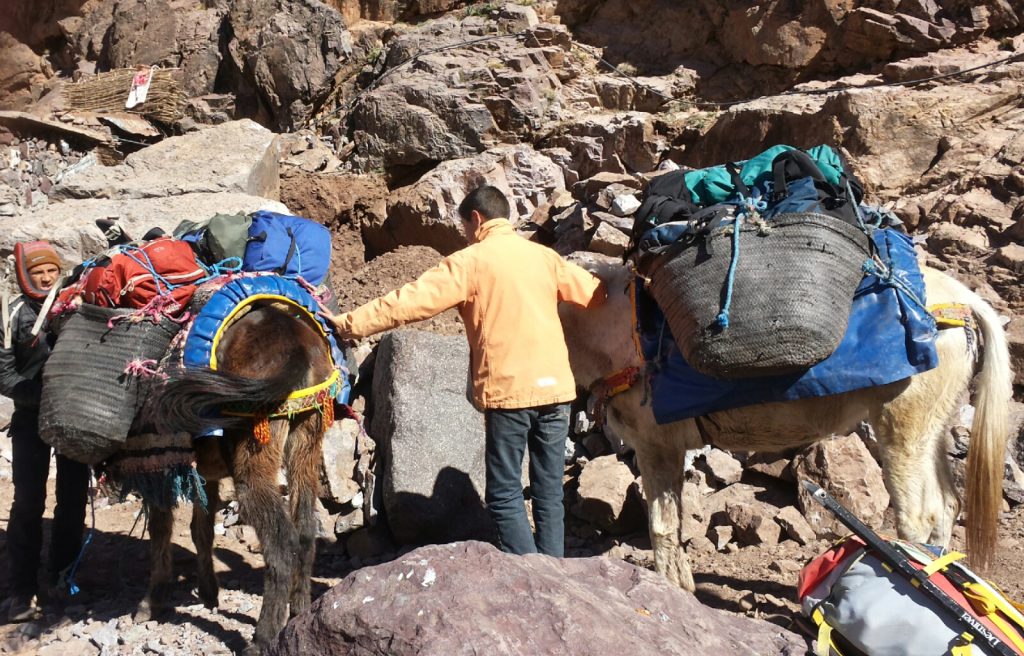
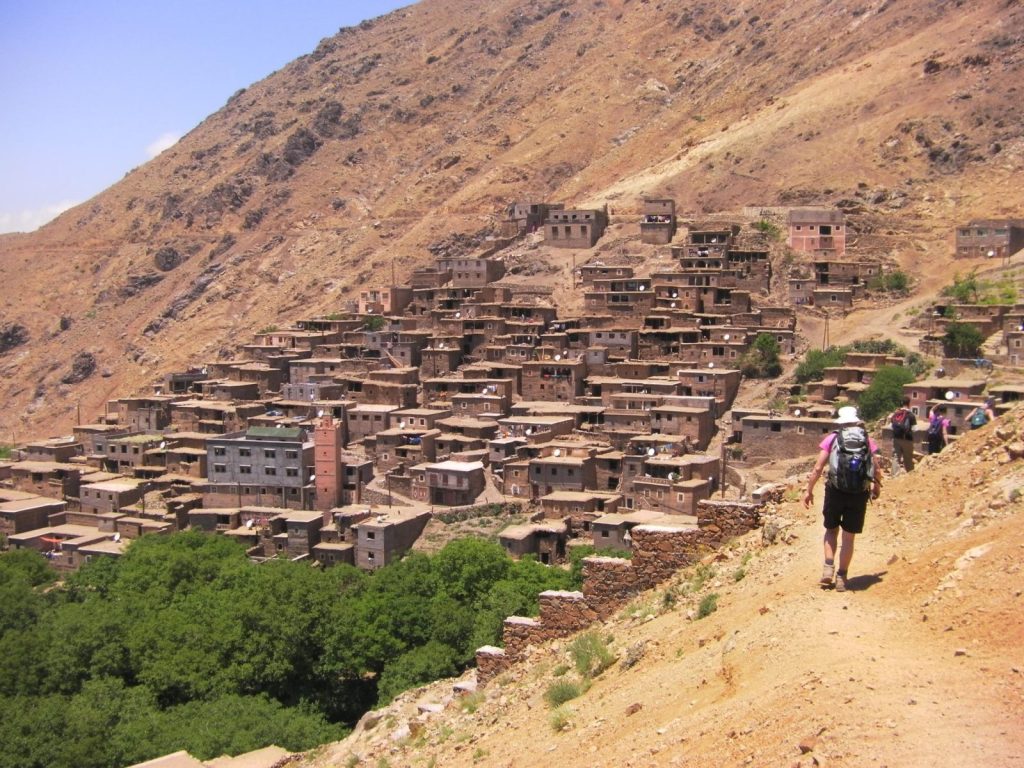
Mount Toubkal summer trek - plan
Starting in Imlil the route goes up to Refuge Tamsoult (2250m) and then follows the yellow line over the high pass (3500m) and drops down to the Toubkal refuges (base camp at 3200m), then climbs the mountain and comes back to Imlil down the main valley. Total distance is about 40kms.
- The first acclimatisation hike is 18 kms just beyond the map – 18kms, up and down 1000m, 7 hrs
- Imlil to Tamsoult – 11kms, up 800m and down 400m, 5-6 hours
- Tamsoult to Toubkal Refuge – 10 kms, up 1200m, down 300m, 6 hours
- Toubkal Refuge to summit – 4 kms, up and down 980m, 5 hours
- Toubkal Refuge to Imlil – 5 hours, down 1400m, 5 hours
To buy the map, there is a 1:50,000 online at Stanfords in London.
Topographical map showing the whole loop for the trek
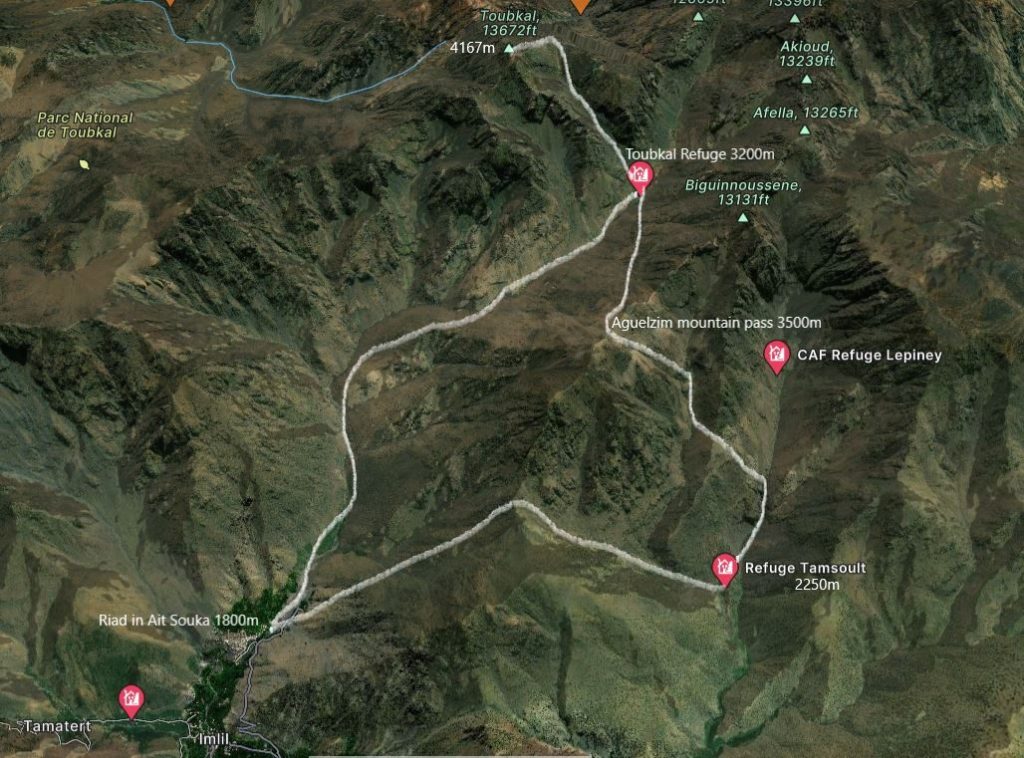
Topograpical map showing the route to the summit of Toubkal
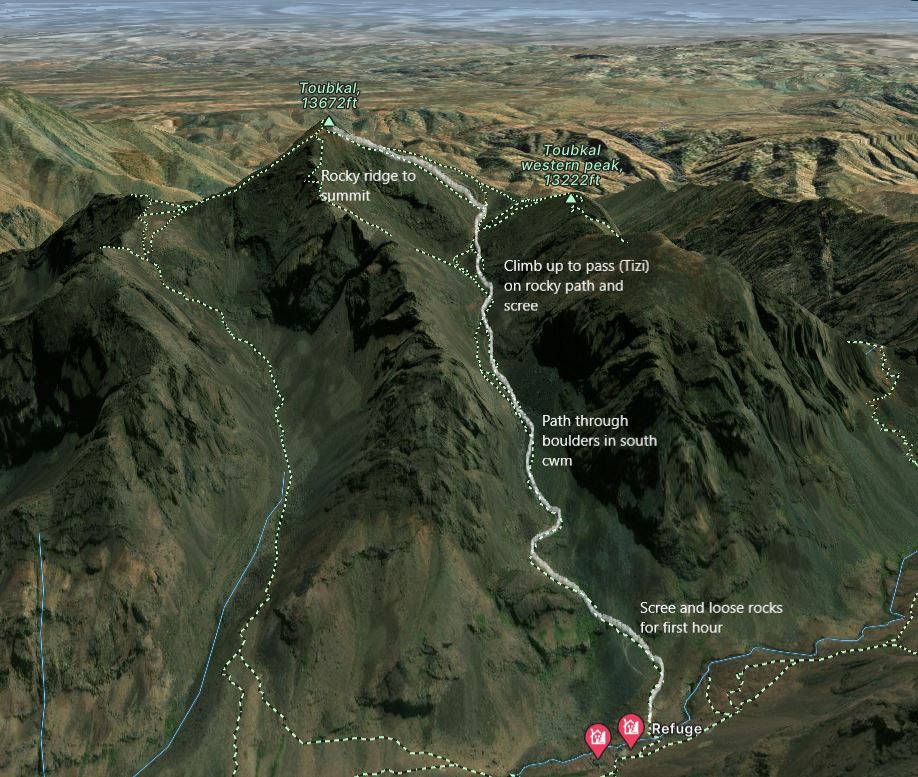
Daily routes
Day 1& 2 – arrive Marrakech and transfer to Imlil
Day 3 around Imlil – 18 kms – from the riad hike uphill towards the pass and then drop down to Ikiss for a lunch in a glade nearby, follow the route contouring round the hill and up to the pass at 2050m and then down to Imlil.
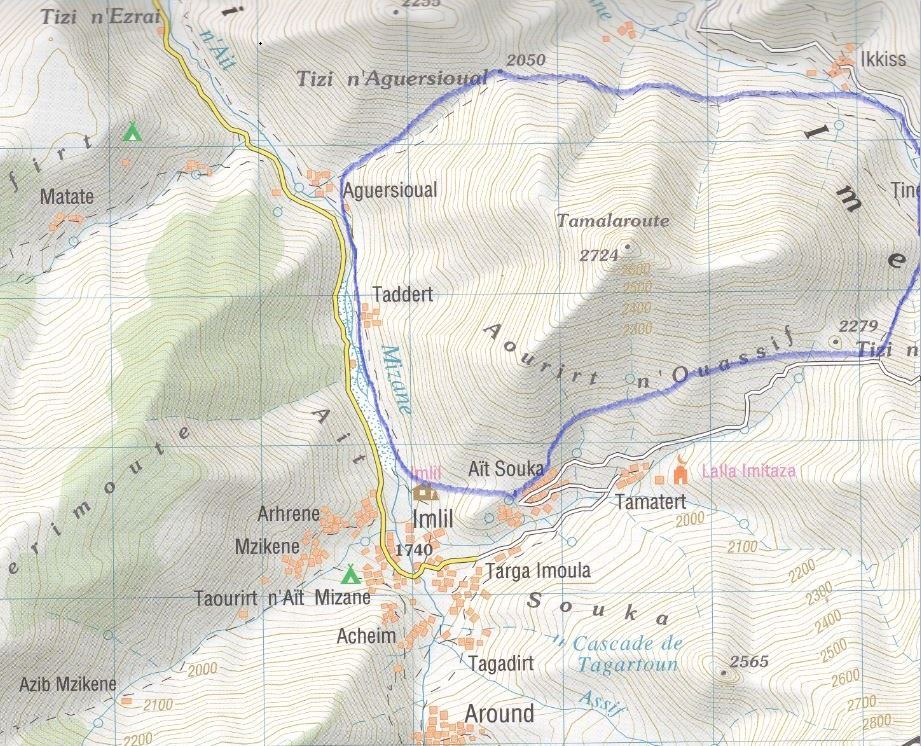
Day 4 Imlil to Tamsoult – hike through Imlil and up to the pass and then down into Azzadene Valley and across to Tamsoult Refuge.
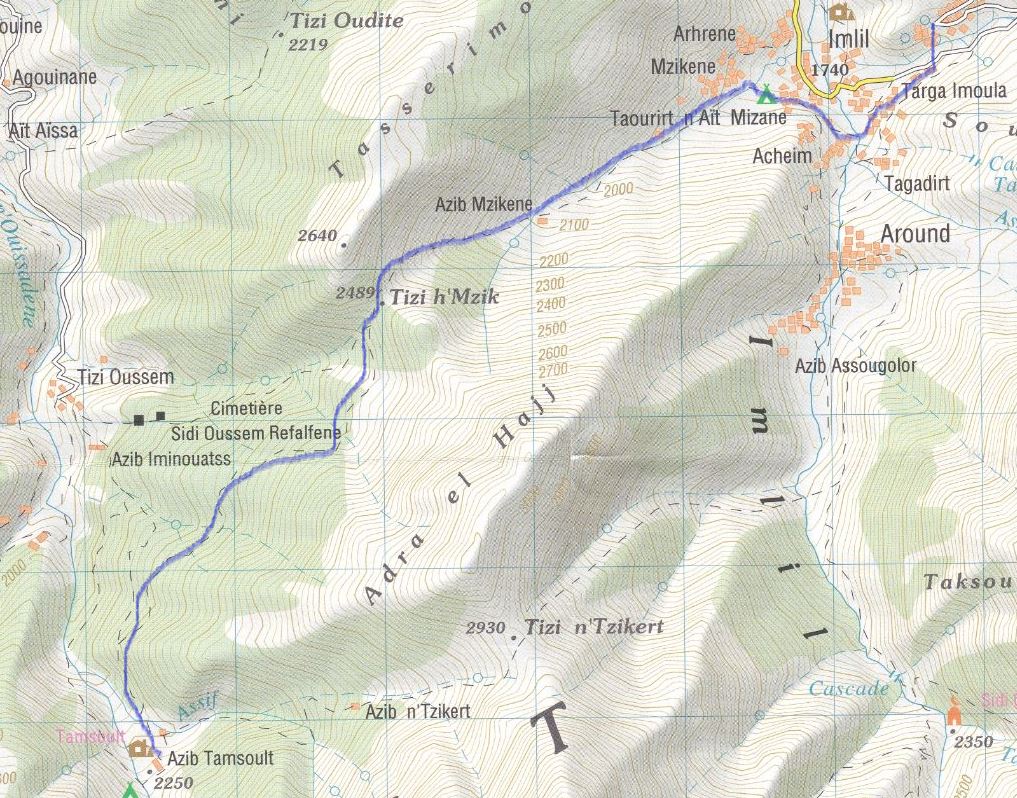
Day 5 – Tamsoult to Toubkal Refuge – hike up to the waterfalls and then uphill all the way to the Azuemgil Pass at 3500m for lunch and views and then down to the Toubkal Refuge at 3200m.
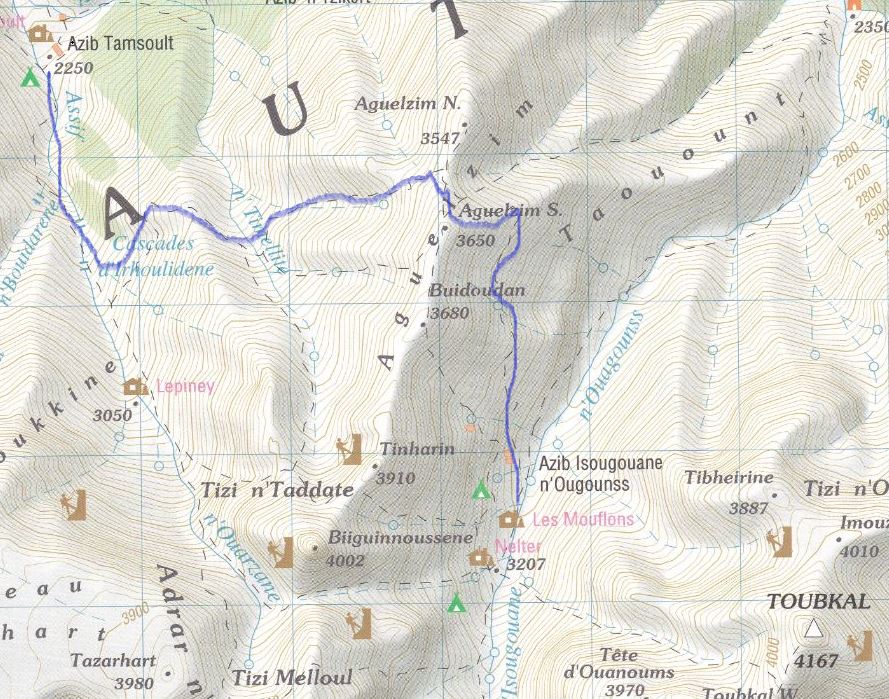
Day 6 – Toubkal Summit – follow the trail up to the cwm and to the Toukbal Pass and along the rocky ridge to the summit and the same descent.
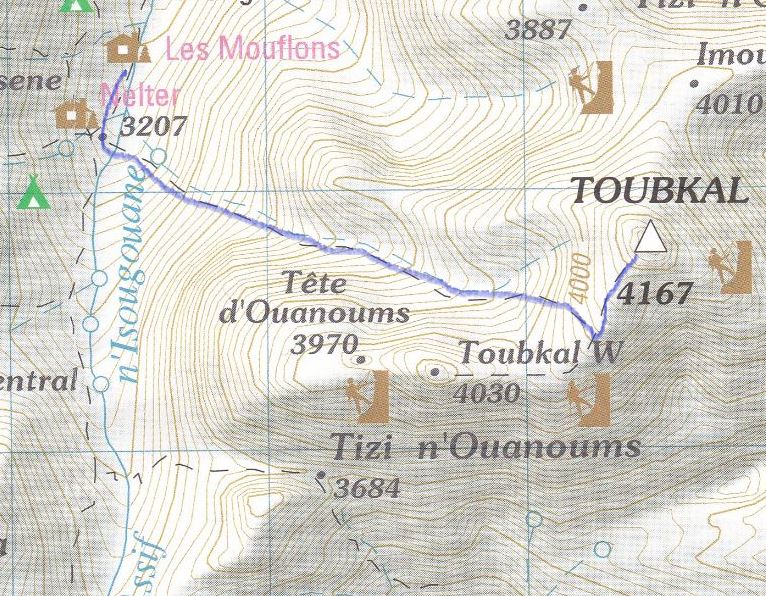
Day 7 – Toubkal down to Imlil – after our summit earlier in the day it’s an easy path down the valley around 12 kms
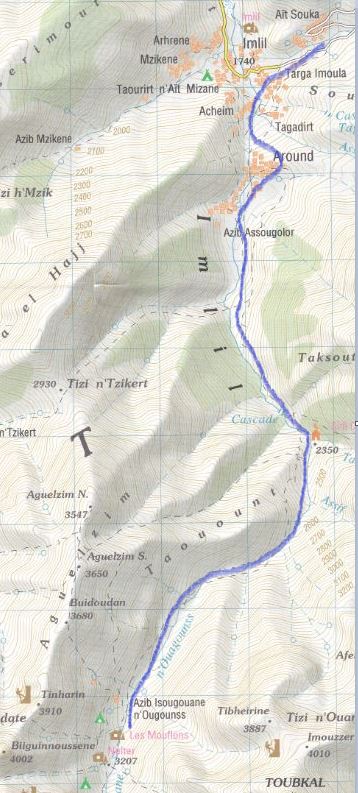
The Atlas Range extends 2500kms and separates the Atlantic and Mediterranean seas from the Sahara Desert. Toubkal is more or less in the middle of the High Atlas, the middle of the three ranges.
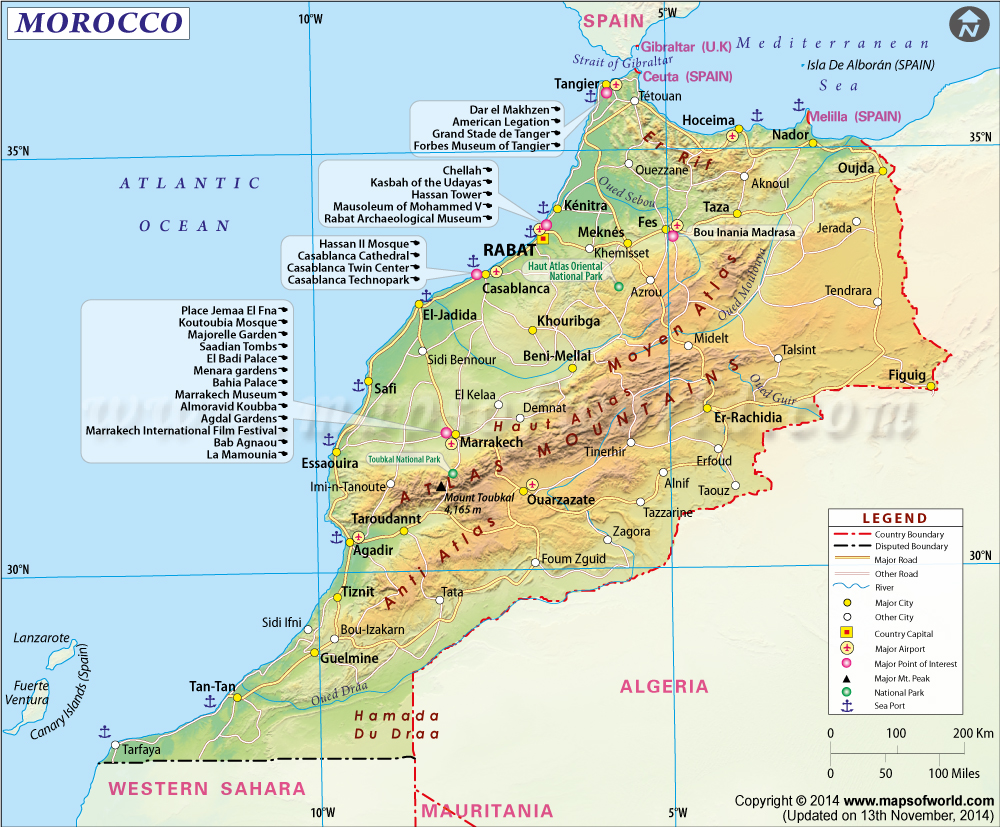
The terrain on the Toukbal trek
Most of the paths are in good condition, some are steeper and looser under foot than others. Around the villages the paths are very well used, many with water channels running alongside them. You are constantly meeting people and mules. Once out of the town the trails wind up valleys and up to the high passes, the issue is mainly slipping on loose stones and scree. Bring walking poles which are very useful coming down and especially useful if you are worried about your knees.
In the latter end of the season snow will start to fall on the high passes and collect in the gullies, and the high passes become impassable for mules so the bags get carried by porters instead. It’s a good idea to take mini spikes for patches of snow.
Toubkal itself is a mixture of scree and rock during the summer season, it’s not difficult but the danger would be coming down on the paths too fast. With a lot of people going up and down there are plenty of sections where the ground has been eroded and the gravel is very loose.
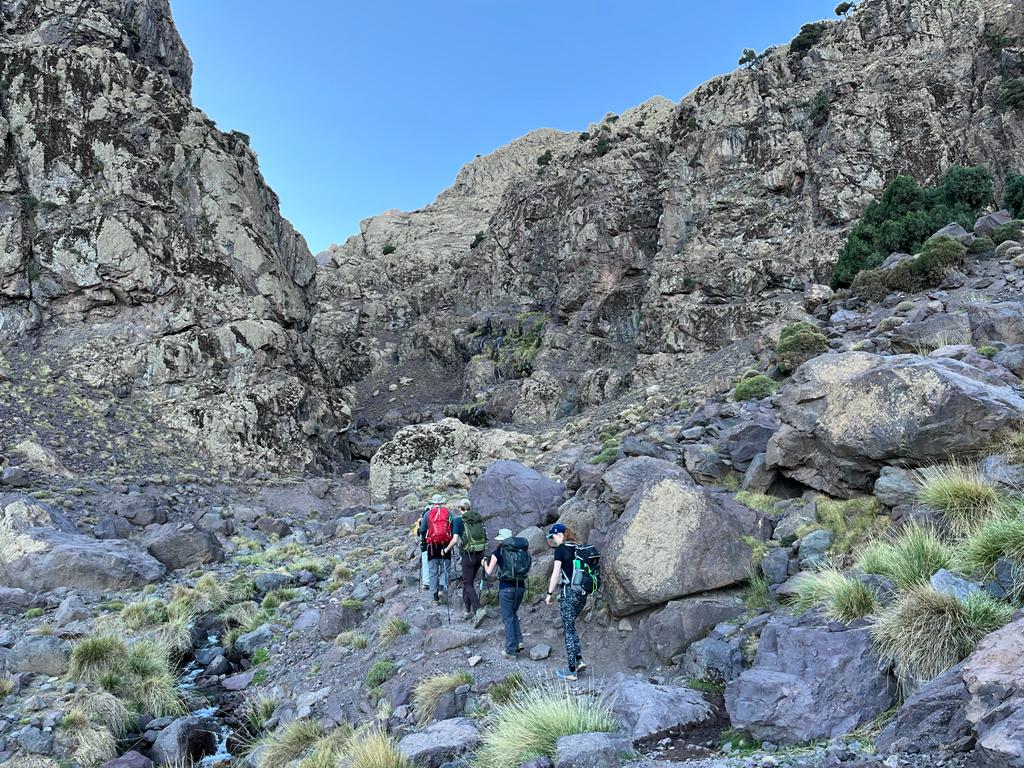
Accommodation on the trip
In Marrakech we use a riad near to the main square in the centre which provides breakfast (eggs, bread, croissants, coffee/tea, juice), and in Imlil we use a riad in the village of Ait Souka with a roof terrace and comfortable rooms with hot showers and full board. In the mountains for this trek we use the Refuge Tamsoult which can take up to 50 people and either of the two refuges at the base of Toubkal (Neltner or Mouflon), both of which can take over 100 people. All the refuges have flush toilets, showers and washing facilities, and dormitories with mattresses, pillows and blankets. Sometimes in the hottest months we would prefer to camp outside. The refuges sell bottled water and the Toubkal ones have a shop where you can buy snacks and other items like toilet rolls. All refuges ask that you wear ‘hut shoes’ which can be sandals or crocs or trainers.
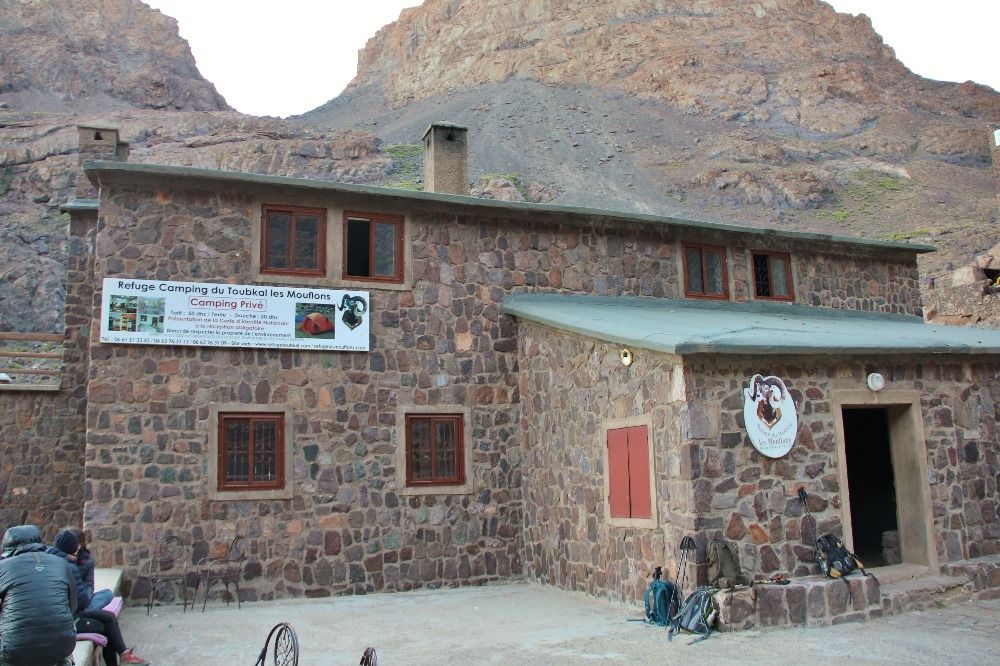
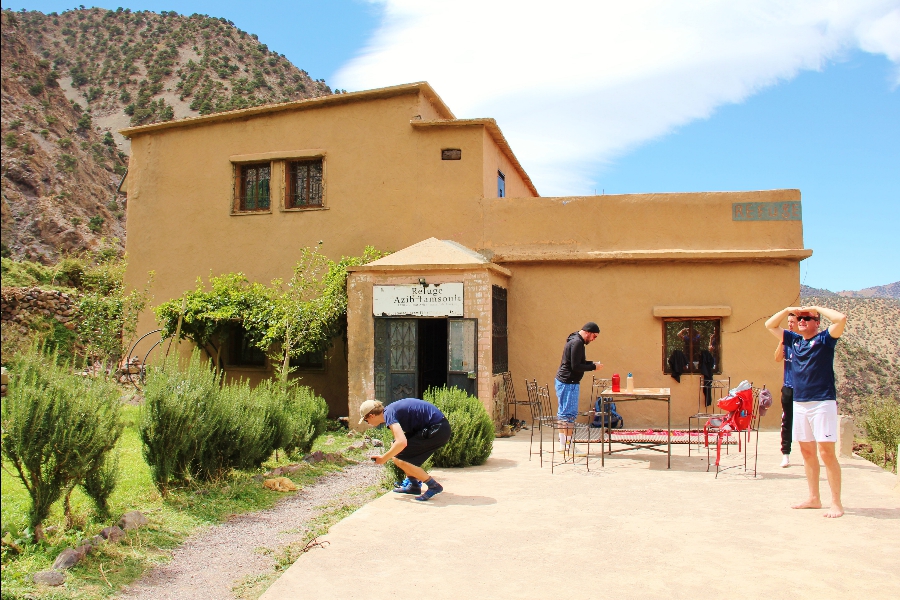
What to wear and take on the trek
Carry a small 30-40 litre day pack each day with essentials like water, snacks, suncream, sunhat and camera, and your main bag will go onto a mule. The mules carry 80-100 kgs and a duffle bag is best for easy access. Later in the season when the passes become difficult for mules, the porters will carry the main bag and it is better to have a bag with straps.
Most of the days you can hike in shorts and a T-shirt with hiking shoes and a sun hat, changing into loose clothing in the evenings when you might want a light fleece. Going higher, the evenings get a bit cooler but not below freezing until October. For the summit day wear long trousers, a base layer, fleece and windproof jacket. Some people take a lightweight synthetic down top. A warm hat and gloves are also necessary, the top can be windy and cold. Take several sets of socks and underwear because in the heat and dust they do need changing regularly. A thin face buff is really useful for the dust too. Try to take synthetic materials that dry quickly in the sun rather than cotton.
The whole trip can be done in a pair of fairly lightweight hiking shoes or boots; the issue is mostly sore feet after so much walking on rocky paths, so a proper sole would be a good idea. Try to avoid soles which are too bendy, they really don’t give much protection to your feet. Do also take sandals or hut shoes for using in the refuges (crocs are good for this).
Sleeping in the huts can be warm, a 3 season bag will be fine, and there are blankets available too if you need them. You will only need your bag in the mountain refuges. You won’t need a sleeping mat and if we decide to camp then we provide foam mattresses.
Also take a sunhat and a warm hat, gloves, walking poles if you like, plenty of snacks, a wash kit and a personal medical kit, a bag for dirty clothes, plenty of sun cream and UV protection for your lips. There is power in the mountain refuges but better to take a small power pack for charging. Good sunglasses are necessary.
Also take water bottles or a camelbak, enough for two litres. All the water on the mountain is bottled and you can buy them from the hut guardian and transfer the water to your containers. You can ask the cooks to boil water if you like, or take a steripen which uses UV to disinfect the water, but most people buy bottled water.
Washkit
The refuges have running water, toilets and showers which can be hot. You can shower and shave and keep clean, normally people feel very dusty and hot so do bring what you need and a light towel. Also bring toilet paper which is not supplied in the refuges and sanitary requirements with biodegradable bags to dispose of them because you’re not allowed to flush anything down the loo except human waste. There is a wastebasket by the toilet to use. Nail clippers and tweezers are also useful.
Personal first aid
Blister plasters, plasters, headache tablets, antiseptic for cuts and grazes and a gauze pad with a bandage in case of a slip on the gravel. Electrolytes for heat exhaustion and rehydration sachets and something for travellers diarrhoea (mostly picked up in Marrakech, so avoid ice and fish). Eye drops for hot dry eyes is also useful. If you wear contact lenses then take plenty of saline solution. Moisturizing cream is also very useful and talc powder for the feet.
There is a detailed packing list on this page which shows what you need on this trekking peak in both winter and summer.
Travelling clothes should take into account the local culture, in the city please dress conservatively to avoid offending the local people. You can leave them in the riad for safekeeping while up in the mountains.
General Costs
Renting – we have sleeping bags for rent and trekking poles, or you can rent locally in Imlil. We also have Adventure Alternative Nalgene water bottles for sale.
Cash to bring – the local currency is Moroccan dirham and most likely you will need to buy these in Morocco at the airport or at any of the forexes in town. There are also ATMs in Marrakech so you can use a credit card or currency card to withdraw money. In Imlil and in the refuges you will need cash in dirham all the time. You will want cash for meals in Marrakech, drinks and snacks in Imlil, any local rental items, souvenirs, bottled water up in the refuges, some snacks from the shop in the Toubkal refuge if needed, and money for tips.
The Moroccan dirham exchange rate is normally stable at around 100 to the dollar and euro and 110 to the pound.
Local costs – a meal with drinks in Marrakech can be around 200 dirham, teas and coffees in Imlil are 10-15 dirham, and a litre of bottled water is 100 dirham. You can buy many souvenirs of course, from carpets and rugs to tagine dishes, ceramic bowls, gems and trinkets. Everything is negotiable. The tip for a mule driver on this week long trip is normally 300 dirham and for the guide is 500 dirham, so it’s a matter of splitting this figure between the number in the group.
Food – Meals on the trek are cooked by the Berber muleteers. Example meals:
- Breakfast: Jam, bread, boiled eggs, fruit, juice, butter, coffee, milk, porridge
- Lunch: salad, tomatoes, carrots, lentils, beans, rice or pasta, fish (sardines, tuna), fruit
- Dinner: Soup, Morooccan tajine, couscous, olives, nuts, fruit
Let us know about your catering preferences when you confirm your booking to ensure any dietary requirements are met.
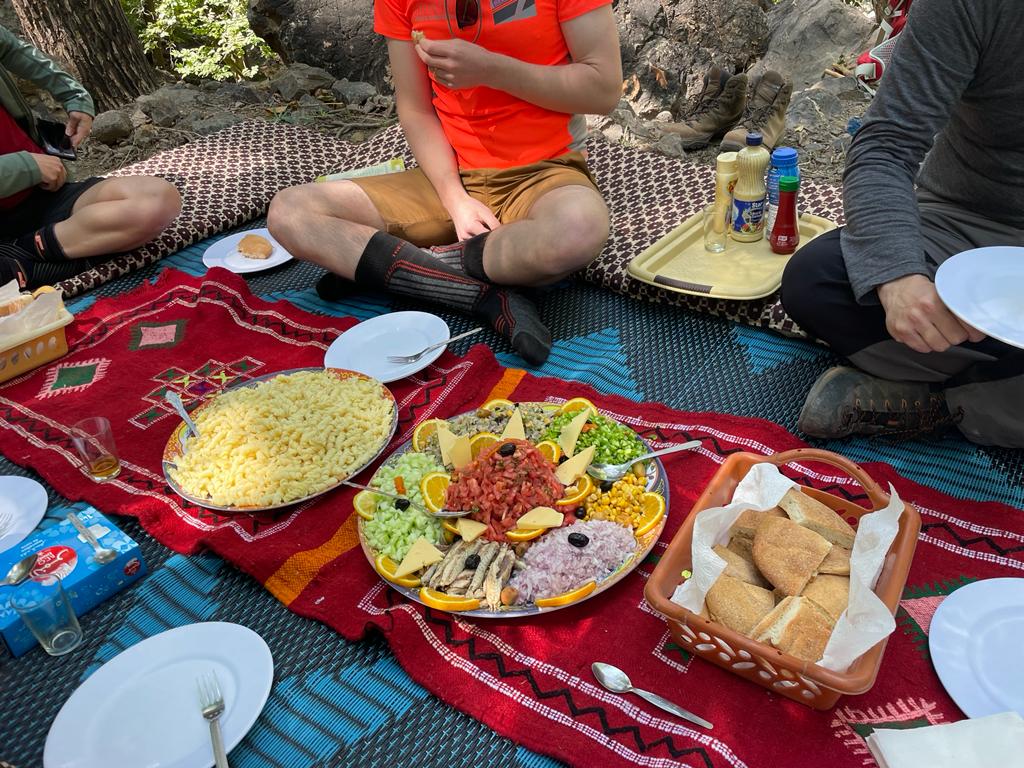

Frequently Asked Questions
Key Information & Guides
General Morocco Information
Health and Safety Guides
Preparation & Kit Guides
Planning Your Trip
Book Your Adventure of a Lifetime Now
Discover our trips to other Countries
Our Morocco Posts
We’re dedicated to helping you make the most of your next adventure trekking holiday. That’s why we’ve created our travel blog full of in-depth trekking guides, travel inspiration and other fantastic information. Having done all of these climbs many times already, we want to pass on our wealth of trekking wisdom to you.
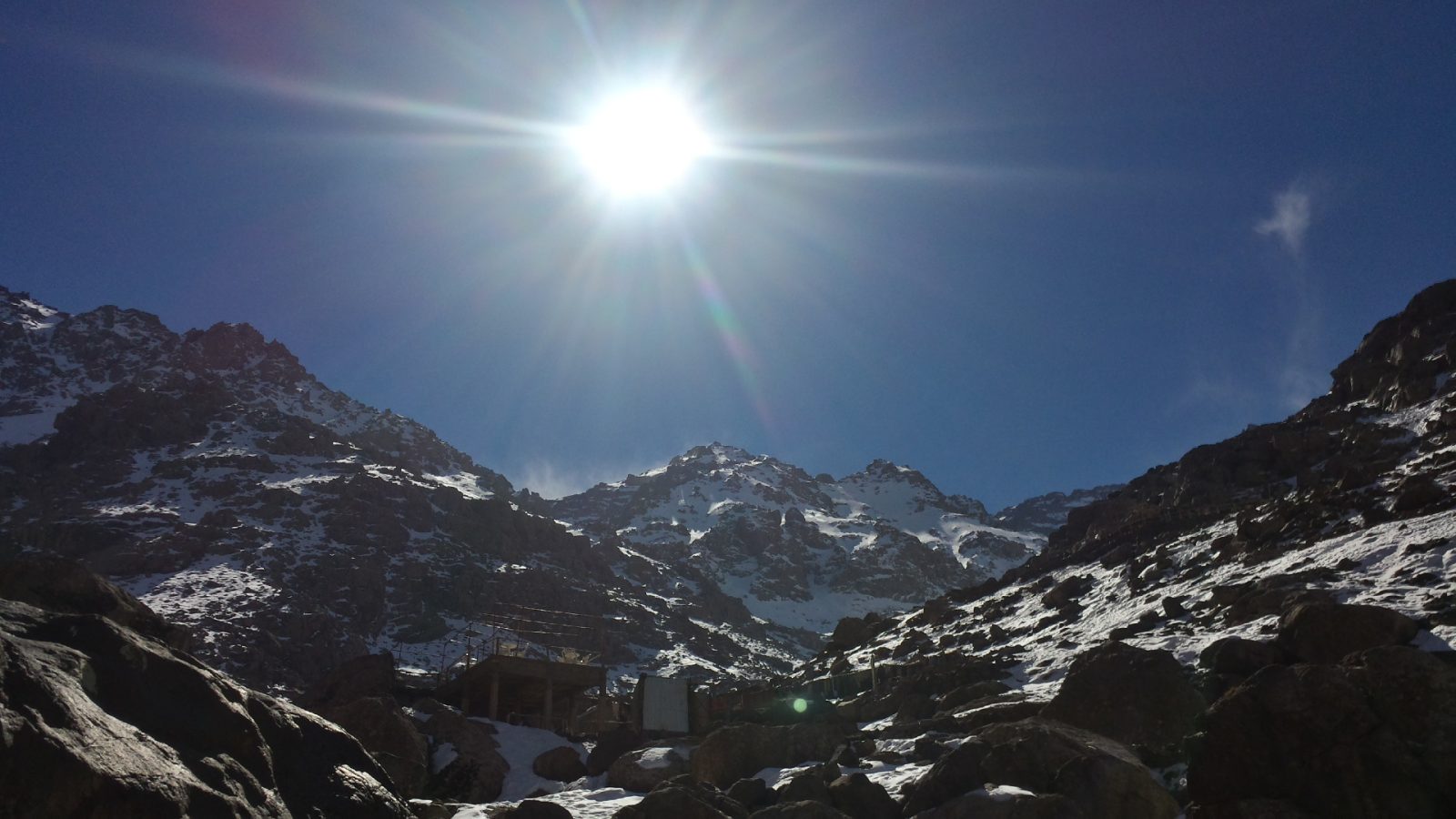
Facts about Mount Toubkal
Mount Toubkal or Jebel Toubkal (Jebel is a term primarily used in North Africa and the Middle East to refer to mountains and mountain ranges) lays...
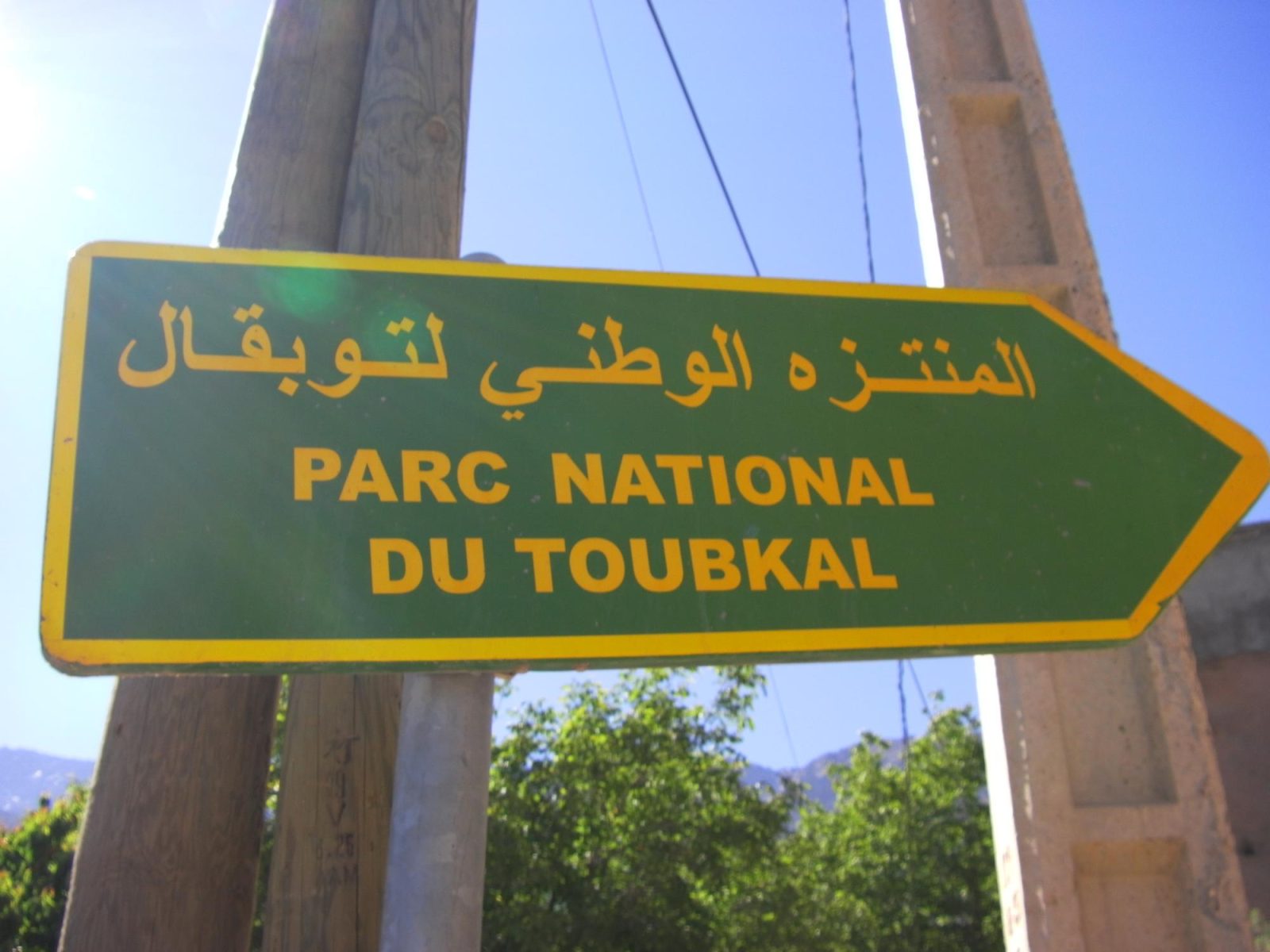
How hard is it to climb Mount Toubkal?
The main difficulty for most people who climb Mount Toubkal is altitude sickness and if you’re new to trekking then you may well...

